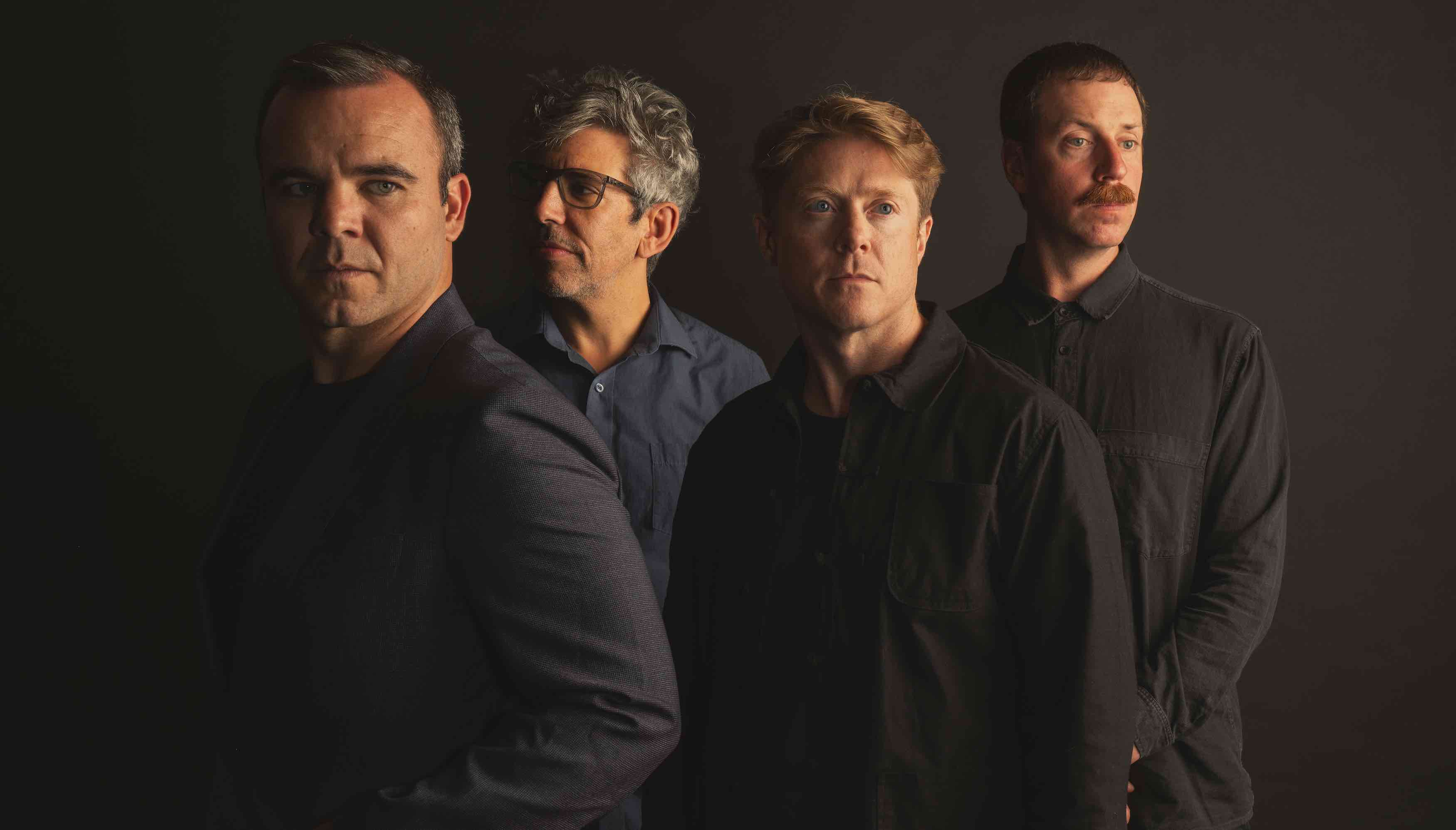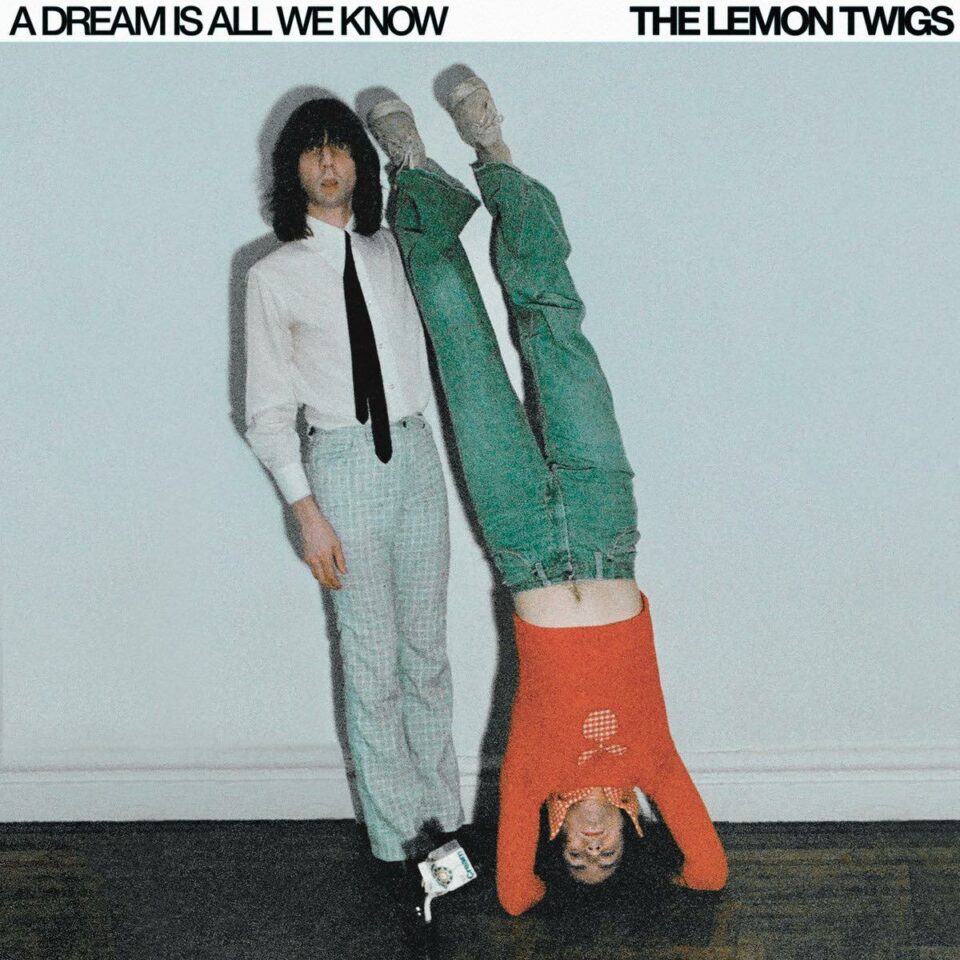When we go through loss, how do we pick up the pieces? How do we begin anew? These are a few of the questions posed on Future Islands’ concise seventh album People Who Aren’t There Anymore, a record which situates us in the disorienting final throes and aftershocks of vocalist Samuel T. Herring’s breakup. Since forming back in 2006, the band—Herring, guitarist William Cashion, and keyboardist Gerrit Wilmers—have been leaving their mark on a continually growing audience. Having initially started by making experimental bedroom pop, they soon evolved into propulsive, stadium-filling synthpop, which provided a cathartic complement to Herring’s deeply autobiographical lyrics.
The band’s newest chapter has seen the individual members collaborate from further afield than ever before, as Herring tells me over Zoom. Cashion now lives in Los Angeles, while at the time of the call, Herring is in New Orleans. Yet the distance has had little impact on their creativity. “We did a live jam session when I was in Sweden and the guys were in Baltimore,” Herring tells me. “My vocal was plugged in through Zoom from a cabin in the south of Sweden and we were synced up perfectly. We were able to create what was the roots of ‘King of Sweden,’ and that showed us that we don’t have to feel limitations, because sometimes you’re in the same city but you’re not inspired.”
Location has had little effect in the history of Future Islands, with Herring often writing lyrics while away in various corners of the world as Cashion and Wilmers bring their own parts to the table separately. Sweden, however, plays a key role in People Who Aren’t There Anymore, as Herring would fly there whenever he could during the height of the pandemic to visit his then-partner, Swedish actress Julia Ragnarsson, as they gradually drifted apart. What follows is the give-and-take between two people clinging onto something they know inevitably isn’t going to survive.
“The weird thing about this album is that about seven of the songs were written when I was still in a relationship,” Herring notes. “The first group of songs were written in the first seven months of the pandemic. I was finally able to go back to Sweden for three months, and then I had to leave again because of visa restrictions. It was devastating to finally get back to a normal place and then leave again. Then I went again and came back and the split happened, and I wound up going back to the US.” Herring went from a place where he had a vision of the future to having it suddenly fall apart—what he knew as home no longer existed.
“It’s still something I’m trying to work out, because there’s a part of me that knows I’ll never truly have a home. But I also desperately want a home—I want some grounding.”
Having spent nearly half his life in the band, home had become a vague concept for Herring before he met Ragnarsson. At the time of our conversation, Future Islands had just passed over 1,400 shows, with life on the road being a constant before and after the pandemic. “Last year I was [living] in Toronto and then New York, and now I’ve been between New Orleans and London. It’s still something I’m trying to work out, because there’s a part of me that knows I’ll never truly have a home. But I also desperately want a home—I want some grounding, but I’m so used to being on the move.” Herring admits that Sweden was the first place in a long time where he had some sense of peace.
Of all the seven songs written just before the breakup, “Say Goodbye” features some of the album’s most gut-wrenching moments. It’s Future Islands at their illuminating best, where the synth tones make you feel like you’re in flight. But in reality, the song finds us in the midst of a downpour. The track was finalized after the breakup with the addition of some extra lines, including what Herring considers the most hurtful one. “‘They didn’t change the day, that’s another month to wait, another month to try to hold onto a lie.’ I had to write that after the split, and it was a devastating realization,” Herring says. “I was trying to say that I was there for her and I was waiting for her, not realizing that I’m actually writing her as the person who’s slipping away.”

When listening to People Who Aren’t There Anymore you may be tempted to solely consider Herring’s divorce, but there are references to multiple forms of loss littering the lyrics. “For my friend, I still grieve,” Herring cries on “Corner of My Eye,” while on “Give Me the Ghost Back” he cuts the figure of a haunted man: “Half awake with the ones who died, the ones who tried.” All of these specters are the people who’ve touched his life, but the song also considers the unexplored possibilities. “It’s about the things I’ve been through in my life—miscarriages, abortions, overdoses of friends, suicide. There are all these different types of griefs that come from what-ifs. But it’s also talking about what really happens when we’re alone with our thoughts and we don’t have anywhere to turn to. Night comes in and we see the faces of those who aren’t there anymore.”
Herring second guessed putting in some of the lyrics of “Give Me the Ghost Back,” one of the band’s most emotionally bracing tracks, but there’s great power in telling the truth. It’s a power that’s permeated the work of Future Islands since the beginning, where the band are able to translate the hardest moments into simple, understandable terms. It’s safe to say that there have been plenty of epiphanies sparked when listening to the band. “I try to use a language that’s universal. It’s very simple dualities—night and day, summer and winter, things the average person can understand and attach emotions to in a very natural way.”
“I try to use a language that’s universal. It’s very simple dualities—night and day, summer and winter, things the average person can understand and attach emotions to in a very natural way.”
Even though the breakup remains difficult, that isn’t to say that new doors haven’t been opened, too—he’s been in therapy since, which has had a profound effect on him as it’s helped him to recontextualize his relationships with those closest to him. “I’m a very reactive person, and even taking a minute to respond to something can change the whole color of it. It actually helps my writing, because it makes me more reflective. There’s still a control element to a show. I decide how I want to share my emotions, and really who I am is an extremely private person. I don’t like to ask for help, I don’t share because I don’t want someone to take on my pain or guilt. It’s made me realize I can talk to my family more openly and I can be more open with my friends.”
These realizations have come through the process of therapy, but the song “The Garden Wheel”—one of the few written after the breakup—was always a brighter glimpse at Herring’s next chapter. Using the metaphor of a farmer tending to his fields before the work gets too hard, there’s still success despite the seeming failure, the seeds are still there waiting to grow again when the time is right. “Everything changes,” Herring says. “You go through these experiences and the world looks different, but it is what it is. It’s the life cycle.”
“The Garden Wheel” is one final easter egg and, for once, a moment where Herring doesn't have to share anything with us. “There are secrets within that song, conceptually buried for everyone to see, but they don’t know and I’m not telling.” After all this time, Herring has earned the right to keep a secret or two from us. FL









